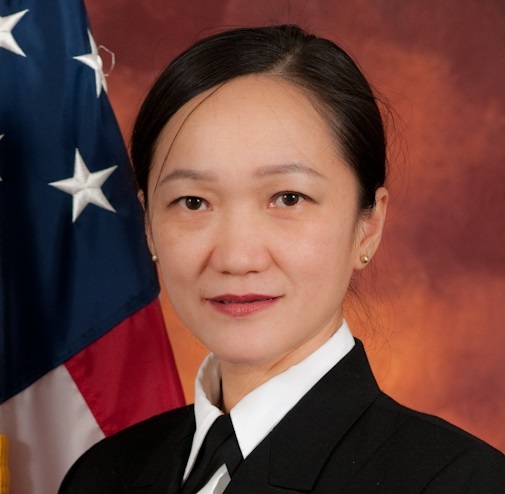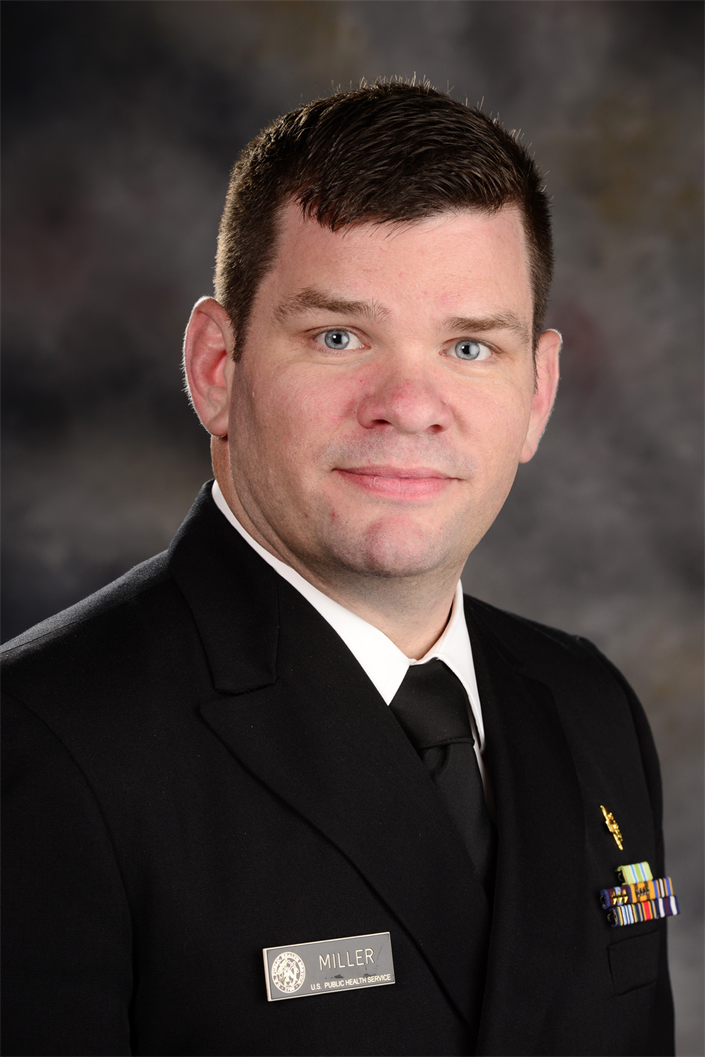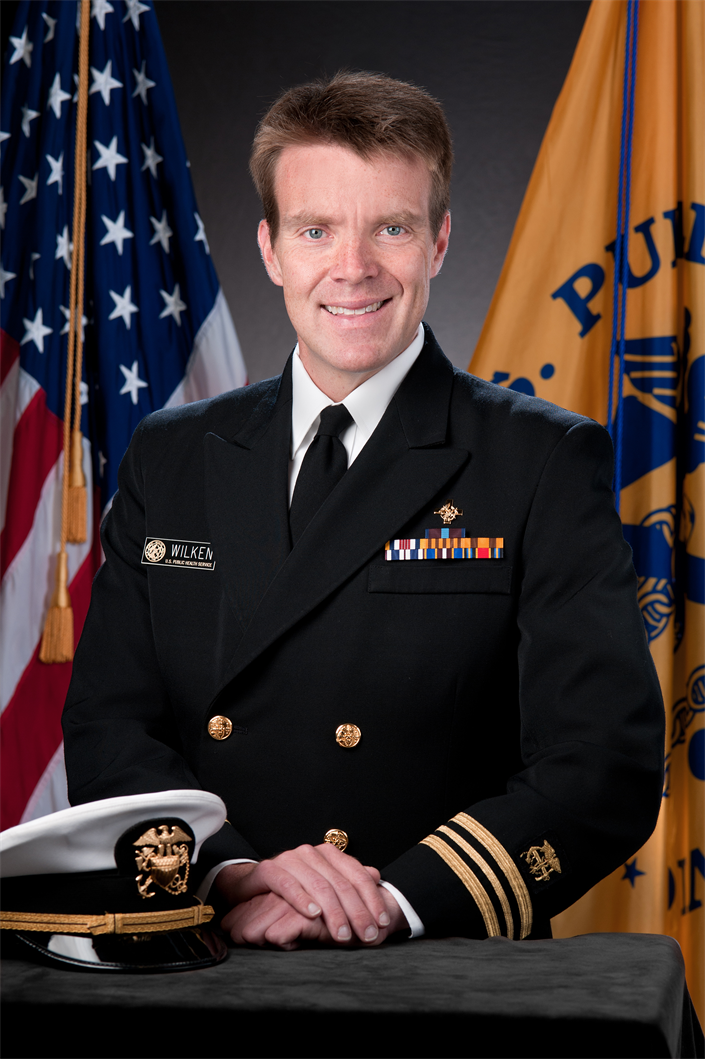2016 Derek Dunn Memorial Senior Scientist Officer of the Year
CAPT Sally Hu

CAPT Sally Hu is a senior licensing and patenting manager at National Institute of Dental and Craniofacial Research (NIDCR) of National Institutes of Health (NIH). CAPT Hu is responsible for managing patent prosecution, marketing and licensing activities on all NIDCR technologies/inventions. Prior to that, she served as a senior licensing and patenting manager at the Office of Technology Transfer of NIH by managing over 200 pending or issued patent families related to HIV therapeutic technologies. She has completed more than 100 license agreements with the companies and organizations from the USA, United Kingdom, Italy, Belgium, Switzerland, France, Mexico, China, India, and other countries. One of these license agreements led to Prezista®, which was the first Food and Drug Administration (FDA) approved anti-AIDS oral drug for patients with the drug-resistant disease, resulting in saving lives around the world and bringing in more than $280 million in royalty income for NIH so far.
Moreover, CAPT Hu has served as the team commander of the National Capital Region team (NCR) of Regional Incident Support Teams (RIST, Tier 1) and has led 29 deployments since 2010. In addition, CAPT Hu served as a SciPAC voting member for two terms, chaired 6 different SciPAC subcommittees and served on the 2010 SciPAC Executive Board to provide various leaderships/services. She has also served as Chair of one of the SciPAC Appointment Boards. CAPT Hu has received over 120 Certifications and Appreciation Letters for her leadership in various groups and her PHS support activities.
Finally, CAPT Hu has received 27 USPHS awards and 8 civilian awards including 2 Outstanding Service Medals for her continued and exemplary achievements to the advancement of the nation’s public health, to her fellow officers’ career development, and for her excellent leadership in USPHS/health-related professional/community activities.
2016 Junior Scientist Officer of the Year
LCDR Mark Miller

Mark Miller, Ph.D., of the U.S. Public Health Service, serves as Chief of Staff at the National Institute of Environmental Health Sciences, a branch of the National Institutes of Health. As part of NIEHS’s senior leadership team he provides scientific direction and strategic planning for a wide range of programs, including research into endocrine-disrupting chemicals, developmental origins of health and disease and persistent organic pollutants. LCDR Miller further functions as a key advisor on sensitive, high-priority environmental health science issues and projects requiring HHS-wide and interdepartmental coordination. He provides critical analyses and deeper understanding of scientific and programmatic factors that affect the Institute’s policy and program decisions. As an Institute leader, he manages the budget process for the Office of the Director, Chairs the NIEHS Space and Facilities Governance Committee, providing solution-oriented oversight to Institute-wide resource allocation, and he serves as the Senior Leadership Representative on the Labor Management Committee, providing high-level guidance on union and labor relations.
LCDR Miller is an active and dedicated officer, committed to the mission of the PHS Commissioned Corps. As the Deputy Planning Chief on Tier 1: Rapid Deployment Force-1, LCDR Miller has led the planning and execution of 5 hands-on, real-world, team training exercises. These trainings have utilized a mix of didactic section training and hands-on interactive events. Specifically, LCDR Miller has lead training effort, developed training materials, organized the planning team, liaised with the ASPR representatives, reported to team leadership during after action reports, and served as the event commander.
LCDR Miller was awarded the 2013 JOAG Excellence Award in recognition of his dedicated effort, leadership ability, and commitment to JOAG through active committee or workgroup participation. He has been an active member of the Scientist Category, supporting the planning of Scientist Category Days and supporting the Visibility Subcommittee. He is finishing his term as the elected Vice President, President and Past-President of the National Capital Area Chapter of the Society of Toxicology (SOT) in 2016. The impact of this group is to stimulate research and encourage communication among professional toxicologists. Finally, he was invited to deliver the prestigious Alumni Keynote Lecture at the University of Michigan School of Public Health 19th Annual Environmental Health Sciences Research Symposium, only 5 years after having completed his doctoral degree. This makes him the youngest alumnus to receive this honor.
2016 Scientist Responder of the Year
LCDR Jason Wilken

LCDR Wilken began his career at the CDC as an Epidemic Intelligence Service (EIS) Officer, and led investigations of coccidioidomycosis outbreaks, Hantavirus exposures among National Park workers, and chemical exposures among workers following a train derailment. Following EIS, he joined CDC’s Career Epidemiology Field Officer (CEFO) program in CDC’s Office of Public Health Preparedness and Response. Assigned as a CEFO to the California Department of Public Health (CDPH), Division of Environmental and Occupational Disease Control, LCDR Wilken provides leadership and expertise in disease surveillance and epidemiology, particularly in the fields of emergency preparedness, disaster response, and environmental and occupational epidemiology. He helps staff a 24/7 duty officer system for chemical incidents in California, leads investigations of occupational infectious disease, and serves as the occupational health liaison for CDPH’s Ebola Virus Disease (EVD), novel influenza, and Middle East Respiratory Syndrome preparedness efforts.
LCDR Wilken has been the Deputy Team Commander of Regional Incident Support Team 9 (RIST9) since 2014, a Tier 1 response team that can deploy within 12 hours of activation. In the past year, LCDR Wilken was deployed five times as a member of RIST9, including responses to Pacific storms and for the California Capstone 2015 catastrophic earthquake simulation, the year’s largest national-level exercise. In 2014, LCDR Wilken also led rapid community needs assessments in two counties following the 2014 South Napa Earthquake, a presidentially-declared major disaster. LCDR Wilken also led a multistate investigation of acute HIV infections that ended an ongoing HIV transmission chain among highly at-risk persons and linked newly-diagnosed persons to care thus preventing additional infections. In 2015, LCDR Wilken deployed to Liberia and served as the epidemiology lead in two counties to support the CDC’s Ebola Virus Disease (EVD) response mission. He supported a community quarantine effort to stop EVD transmission in rural villages, a strategy that ended a transmission chain. During this response, LCDR coordinated efforts between residents, county officials, and non-government organizations to rapidly identify, isolate, and treat persons with probable EVD; wrote emergency grant applications that secured funding for quarantine support services; developed and implemented a video-messaging psychosocial support tool for residents at their homes and persons undergoing evaluation and treatment at an Ebola Treatment Unit.
2016 Scientist Mentor of the Year
CDR James Kenney

Commander James L. Kenney currently serves as Chief of the Laboratory of Microbiology, In-vivo Testing and Standards (LMIVTS) within the Food & Drug Administration (FDA)’s Center for Biologics Evaluation and Research (CBER). The LMIVTS performs quality control release testing and review of manufacturers' test results to ensure biological drug products are safe and effective before release to the public. In addition, CDR Kenney manages the review of Biological License Applications and their supplements, ensuring biological standard use is appropriate, analytical methods are validated and suitable for the intended product, and that products meet specifications and are regulatory compliant prior to release.
CDR Kenney also manages CBER’s Standards and Reagents program. This program is recognized by the World Health Organization (WHO) as one of four Essential Regulatory Laboratories for the production, calibration and distribution of reference materials used world-wide by manufacturers and international regulatory authorities (including the FDA) to formulate and/or confirm the potency of biological drug products, ensuring they are effective for public distribution and use.
CDR Kenney is the Deputy Team Commander of the Regional Incident Support Team in the National Capital Region (RIST-NCR). The RIST-NCR is a Tier 1 team - one of 11 national RISTs that can deploy within 12 hours of activation –and is comprised of 30 Public Health Service Officer Responders.
CDR Kenney currently mentors five junior officers, two of whom he has mentored for over five years. One of his greatest satisfactions in being a Public Health Service Officer is sharing his knowledge and experience to assist others to understand and plan to reach their full potential, while watching them succeed.